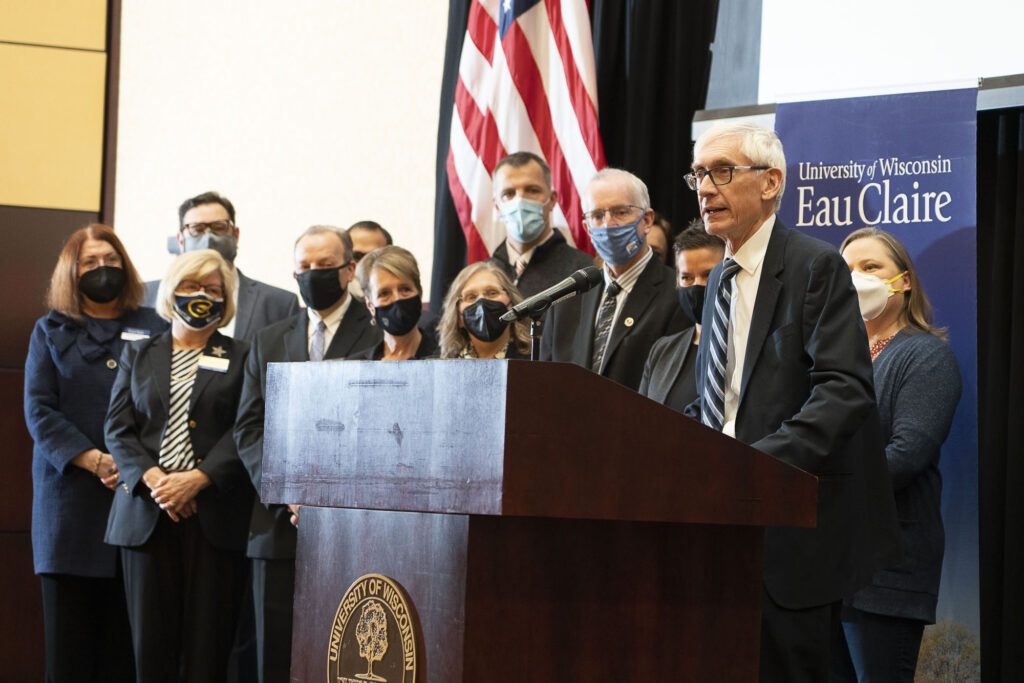Evers Awards $60 Million to Target Worker Shortage
Grants for job training, expanding health care workforce and skills training for prisoners.

Gov. Tony Evers announces new state Workforce Innovation Grants Tuesday morning at a press conference in Eau Claire. Photo courtesy of University of Wisconsin-Eau Claire.
Programs to train manufacturing skills, expand the health care workforce and provide skills training to people in prison as well as support after their release were some of the projects that will share in nearly $60 million in state grants awarded Tuesday to address workforce challenges underscored by the COVID-19 pandemic.
“What the pandemic really revealed was what we thought were individual problems were really much larger than that,” said Missy Hughes, secretary and CEO of the Wisconsin Economic Development Corp. (WEDC), in an interview. “And so we need real investments to try to solve them.”
“Wisconsin has one of the lowest unemployment rates in the country and we have high labor participation, but our state faces long-standing workforce challenges that existed for years before the pandemic,” Evers said. Because no one solution fits every part of the state, he added, the grant program was designed “to encourage regions and communities to develop cutting-edge, long-term solutions to the unique workforce challenges they face.”
The grants are part of a $100 million package that WEDC and the Evers administration established to address substantial workforce gaps around Wisconsin.
The administration is spending another $30 million for programs through DWD: $20 million for subsidized transitional jobs to train workers and $10 million to support navigators in a pilot program to help people in two regions of the state who have faced obstacles in staying connected with work. The full $130 million comes from the state’s share of the American Rescue Plan Act (ARPA), the federal pandemic relief bill that was enacted in late March.
Altogether, a dozen Workforce Innovation Grants were announced on Tuesday, totaling $59.5 million.
In Eau Claire, the administration highlighted two grant recipients, Chippewa Valley Technical College and the University of Wisconsin-Eau Claire.
UWEC was awarded up to $9.4 million for projects to provide training in health care, education and social services. It includes a partnership with the Mayo Clinic Health System of Northwestern Wisconsin to train more nurses for the region. It also includes partnerships with local school districts and social service organizations to place students in education and in social work in rural communities with a goal of encouraging them to stay and establish their careers there.
The University of Wisconsin Prison Education Initiative was awarded up to $5.7 million to teach work skills to incarcerated people during their term in prison and continuing after their release with career placement help.
In Green County, the Green County Family YMCA was granted up to $3.7 million to help build a day care and preschool wing as well as a new youth development wing.
The proponents of projects centering child care reason that “if we are able to build out our child care system, so that everyone has access to affordable, quality, safe child care, then that’s a problem that is solved,” Hughes said.
All 12 winning projects involved collaboration among several agencies, businesses and organizations in their regions. They were also distinctive to the regions that produced the applications, she said.
Collaboration was a high priority for WEDC when it invited applicants. “When I traveled around the state before the pandemic hit, everybody was talking about workforce [shortages],” said Hughes. “But everybody had a different idea on how to solve it — whether it was talent attraction, or skill-building, or entrepreneurship. What really struck me was that folks needed to get together and decide what was most important.”
While funded by a one-time grant, the projects also are designed from the start to develop long-term support, she said, with the applications including an explanation for making them sustainable over the long term.
WEDC will be following up with the grant recipients as they report on their projects along the way. Hughes said that at the three press conference announcements, “there was a palpable sense of excitement,” Hughes said,
“Often you see communities having good ideas, but then they don’t have the resources to execute on those ideas,” she added. “This was a moment where, not only did the communities have ideas, but the resources were being brought to the table for them to be able to execute. That combination was really exciting.”
Wisconsin awards $60M for big projects to ease workforce challenges was originally published by the Wisconsin Examiner.
If you think stories like this are important, become a member of Urban Milwaukee and help support real, independent journalism. Plus you get some cool added benefits.




















